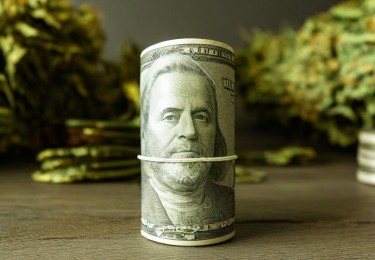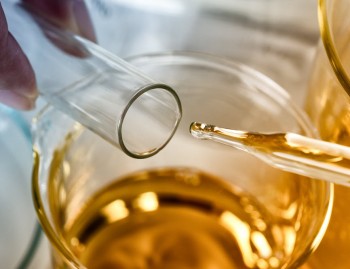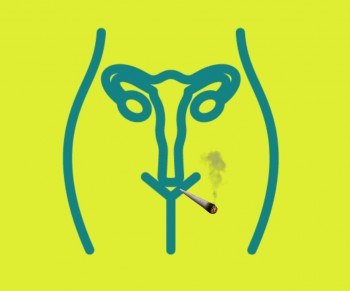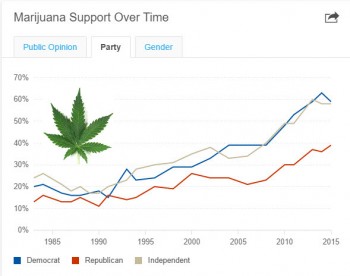
When a federal agency tasked with protecting Americans from dangerous drugs starts claiming that cannabis causes more psychosis than methamphetamine—without a shred of clinical evidence—it's time to ask some uncomfortable questions. Either the Drug Enforcement Administration employs people who failed basic biology, or they're deliberately spreading misinformation to serve interests that have nothing to do with public safety.
The latest embarrassment from the DEA's "Just Think Twice" campaign would be hilarious if it weren't so dangerous. They're literally comparing a plant that's never killed anyone to a synthetic stimulant that destroys brains, rots teeth, and turns users into violent zombies. But according to the DEA's crack team of "experts," cannabis is the real threat because some psychiatrist in Oregon made an offhand comment without citing any comparative studies.
Meanwhile, this same agency has spent seven years blocking MMJ BioPharma—a company with FDA approval, DEA security clearance, and every regulatory box checked—from conducting legitimate pharmaceutical research into cannabis-based medicines. Let that contradiction sink in: the DEA simultaneously claims cannabis is too dangerous to study while spreading propaganda that makes it sound more dangerous than methamphetamine.
This isn't incompetence—it's corruption. The DEA has evolved from Harry Anslinger's racist prohibition enforcement squad into Big Pharma's private military contractor, using badges and federal authority to protect pharmaceutical monopolies while spreading fear-based fiction about natural alternatives.
As MMJ BioPharma CEO Duane Boise noted, we're witnessing "a clown show" where supposed drug experts compare cannabis to methamphetamine "with no clinical basis" while distributing memes about sperm counts and encouraging teenagers to chase Instagram fame instead of using cannabis. This isn't a serious agency—it's a propaganda operation masquerading as law enforcement.
The Methamphetamine Madness: Peak DEA Pseudoscience
The DEA's latest claim that cannabis causes more psychosis than methamphetamine represents such a spectacular departure from reality that it deserves its own category in the annals of government misinformation. Let's examine what actual science tells us about these substances.
Methamphetamine is a synthetic stimulant that literally destroys brain tissue. Long-term meth use causes irreversible damage to dopamine receptors, leading to cognitive impairment, memory loss, and severe psychiatric symptoms including paranoid psychosis. The drug creates hyperthermia that can cause organ failure, triggers violent behavior, and produces physical deterioration so severe that "meth mouth" and "meth face" have become recognized medical conditions.
Cannabis, by contrast, has been used medicinally for thousands of years and has never been conclusively linked to permanent brain damage. While heavy cannabis use can trigger temporary psychotic episodes in predisposed individuals, these episodes typically resolve when use stops, and the link remains controversial among researchers.
The DEA's claim comes from a cherry-picked quote by Oregon psychiatrist David Rettew, who allegedly said marijuana "raises the risk of psychotic disorders more than other drugs, even methamphetamines." Notice what's missing? Any clinical study, peer-reviewed data, or rigorous comparative analysis. Just an offhand opinion that the DEA transformed into official policy guidance.
This is how the DEA operates: they find one person willing to make an outrageous claim, strip away all context and caveats, then present it as settled science. It's the same tactic tobacco companies used to find the one scientist willing to say cigarettes were safe, except now it's a federal agency doing it.
But the methamphetamine comparison isn't just scientifically absurd—it's strategically crafted misinformation. By comparing cannabis to one of the most destructive drugs known to humanity, the DEA creates a false equivalency that justifies continued prohibition while ignoring mountains of evidence about cannabis's relative safety.
The agency's "Just Think Twice" campaign also includes other intellectual gems like encouraging teenagers to pursue "natural highs" from pet stores and Instagram followers instead of using cannabis. Because apparently, the DEA believes social media addiction is healthier than occasional cannabis use. This is the quality of thinking we get from a $3 billion annual budget.
Meanwhile, the same agency that claims cannabis is more dangerous than methamphetamine has spent seven years blocking legitimate pharmaceutical research into cannabis-based medicines. MMJ BioPharma has FDA approval for investigating cannabis treatments for Huntington's Disease and Multiple Sclerosis—devastating neurological conditions that currently have limited treatment options. Yet the DEA refuses to issue the manufacturing license that would allow this research to proceed.
The contradiction is stunning: if cannabis is as dangerous as the DEA claims, shouldn't they welcome rigorous scientific studies to prove their point? Instead, they block research while spreading memes about sperm counts and psychosis rates that contradict available evidence.
This pattern reveals the DEA's true function: not protecting Americans from dangerous drugs, but protecting pharmaceutical companies from natural competition.
Historical Context: From Anslinger's Racism to Big Pharma's Enforcer
The DEA's current circus act makes perfect sense when you understand the agency's origins and evolution. This isn't an organization that suddenly lost its way—it's fulfilling its historic mission of protecting powerful interests through prohibition enforcement.
The DEA traces its lineage to Harry Anslinger's Federal Bureau of Narcotics, established in 1930. Anslinger, a racist bureaucrat who needed to justify his department's existence after alcohol prohibition ended, launched the first federal marijuana prohibition campaign using tactics that would make Joseph Goebbels proud.
Anslinger's propaganda featured lurid stories about "reefer madness" causing violence, insanity, and moral decay. He testified before Congress that cannabis made users "forget the difference between right and wrong" and claimed it caused white women to seek sexual relations with black men—revealing the racist motivations underlying prohibition.
The modern DEA, created in 1973 under Richard Nixon, inherited this propaganda tradition while adding a new mission: protecting the pharmaceutical monopoly Nixon created through the Controlled Substances Act. Nixon's domestic policy chief John Ehrlichman later admitted that drug prohibition was designed to criminalize political enemies, not protect public health.
But the CSA accomplished something more insidious than political persecution—it handed pharmaceutical companies legal monopoly power over drug manufacturing, distribution, and research. By requiring DEA approval for controlled substance research and production, the law ensured that only pharmaceutical companies could access the most therapeutically interesting compounds.
Cannabis prohibition became the cornerstone of this system because cannabis threatens multiple pharmaceutical revenue streams simultaneously. The plant's compounds can treat pain, inflammation, seizures, nausea, anxiety, depression, and numerous other conditions currently dominated by expensive patented medications.
As pharmaceutical companies gained more influence over medical education, research funding, and regulatory agencies, the DEA evolved from a law enforcement agency into Big Pharma's private enforcement arm. Their mission shifted from preventing drug abuse to preventing competition with pharmaceutical products.
This explains why the DEA treats cannabis and methamphetamine—substances with completely different risk profiles—as equivalent threats. It's not about actual danger; it's about protecting pharmaceutical market share from natural competition.
The agency's current leadership continues this tradition of serving corporate rather than public interests. Despite overwhelming evidence of cannabis's medical benefits and relatively low risks, DEA officials continue parroting talking points that could have been written by pharmaceutical lobbyists.
The Double Standard: Big Pharma's Free Pass
While the DEA spreads fear about cannabis psychosis risks, they've remained remarkably silent about actual pharmaceutical scandals that have killed hundreds of thousands of Americans. This selective outrage reveals everything you need to know about the agency's true priorities.
Consider the opioid epidemic, which has claimed over 500,000 American lives since 1999. Pharmaceutical companies like Purdue Pharma deliberately misled doctors and patients about opioid addiction risks, creating the deadliest drug crisis in American history. The DEA's response? Minimal enforcement and token fines that represented a tiny fraction of industry profits.
OxyContin maker Purdue Pharma paid $8.3 billion in settlements—sounds impressive until you realize the company generated over $30 billion in OxyContin revenue. That's not a penalty; it's a cost of doing business. Meanwhile, people caught with small amounts of cannabis face years in federal prison.
Johnson & Johnson provides another instructive example. The company knew for decades that their baby powder contained asbestos linked to cancer, yet continued marketing it to families. They've paid billions in settlements for causing ovarian cancer and mesothelioma in consumers who trusted their products. Where was the DEA's concern about protecting public health from these actual dangers?
The pharmaceutical industry has paid over $100 billion in criminal and civil penalties since 2000 for various forms of fraud, yet the DEA continues treating them as trustworthy partners while demonizing cannabis researchers and medical patients.
Vioxx, manufactured by Merck, killed an estimated 60,000 people through increased heart attack and stroke risks before being withdrawn from the market. The company knew about these risks but hid them from regulators and patients. The DEA's response? Crickets.
Antidepressants like Paxil were marketed to children despite clinical trial data showing increased suicide risks in young patients. The FDA eventually required black box warnings, but only after thousands of young people had been unnecessarily endangered. Again, the DEA showed no interest in protecting public health from these documented pharmaceutical dangers.
This pattern extends across the pharmaceutical industry: Risperdal causing breast growth in boys, Abilify causing compulsive gambling, Chantix causing psychiatric episodes, diabetes medications causing flesh-eating infections. Each scandal involves pharmaceutical companies hiding known risks while marketing dangerous products to vulnerable populations.
Yet the same agency that ignores these documented pharmaceutical dangers claims that cannabis—which has never caused a fatal overdose—poses such a threat that even FDA-approved medical research must be blocked.
The message is clear: if you're a pharmaceutical company causing actual harm with synthetic chemicals, the DEA will look the other way and maybe fine you a small percentage of your profits. But if you're researching natural alternatives that might reduce pharmaceutical dependence, they'll destroy your business with regulatory obstruction.
The Sticky Bottom Line
The DEA's claim that cannabis causes more psychosis than methamphetamine represents the final collapse of whatever credibility this agency once possessed. When federal drug "experts" start comparing healing plants to brain-destroying synthetic chemicals, it's time to admit that the DEA has become a public health menace rather than a protective agency.
But this latest embarrassment isn't an isolated incident—it's the logical endpoint of an agency that was always designed to serve powerful interests rather than protect public welfare. From Harry Anslinger's racist propaganda to today's pharmaceutical protectionism, the DEA has consistently prioritized prohibition ideology over scientific evidence.
The agency's seven-year obstruction of MMJ BioPharma—a company with FDA approval and full regulatory compliance—while spreading memes about cannabis sperm effects reveals their true function. They're not drug enforcement officers; they're pharmaceutical industry enforcers using federal authority to eliminate competition from natural medicines.
Meanwhile, the same agency that blocks cannabis research ignores actual pharmaceutical scandals that have killed hundreds of thousands of Americans. When Purdue Pharma created the opioid epidemic, the DEA's response was minimal. When Johnson & Johnson hid cancer-causing asbestos in baby powder, the DEA remained silent. But when researchers want to study cannabis for treating neurological diseases, suddenly the DEA becomes concerned about public safety.
This selective enforcement exposes the agency's core corruption: they protect pharmaceutical companies that cause documented harm while attacking natural alternatives that threaten industry profits. The DEA isn't fighting a war on drugs—they're fighting a war on pharmaceutical competition.
Incoming DEA Administrator Terrance Cole faces a choice: continue this failed trajectory of propaganda and pharmaceutical protectionism, or acknowledge that the agency has lost all credibility and needs fundamental reform. Given his history of anti-cannabis statements, meaningful change seems unlikely without external pressure.
The solution isn't just issuing MMJ BioPharma's long-overdue license, though that would be a start. The fundamental problem is an agency whose mission contradicts scientific evidence and public health interests. The DEA was created to enforce prohibition policies based on racism and corporate protectionism, and it continues serving those interests today.
Americans deserve drug enforcement that's based on evidence rather than pharmaceutical industry talking points. We need agencies that protect public health from actual dangers rather than protecting corporate profits from natural competition. We need regulators who evaluate substances based on their actual risks and benefits rather than their threat to pharmaceutical market share.
Until the DEA undergoes fundamental reform—or better yet, replacement with science-based public health agencies—we'll continue seeing the same pattern: cannabis researchers blocked while pharmaceutical companies receive free passes for causing documented harm.
The DEA's methamphetamine-cannabis comparison isn't just scientifically absurd—it's a perfect metaphor for an agency that has lost all connection to reality in service of corporate masters. When federal drug "experts" can't tell the difference between healing plants and brain poison, it's time to find new experts.
The clown show has gone on long enough. Americans deserve better than pharmaceutical industry enforcers masquerading as public health protectors.







